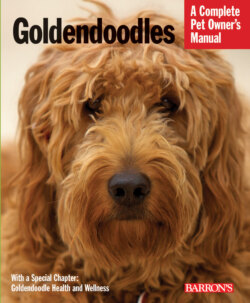Читать книгу Goldendoodles - Edie Mackenzie - Страница 15
На сайте Литреса книга снята с продажи.
Health Guarantees and Testing
ОглавлениеA health guarantee can be used to evaluate a breeder. Having all health tests done (see “Health and Wellness,” pages 44–46) can mitigate the need for a health guarantee—to a point. Mistakes happen. A health guarantee gives the puppy buyer some recourse if his/her puppy’s health is less than optimal. Read the breeder’s health guarantee and contract before you send a deposit. Many breeders and websites claim they guarantee their puppies but fail to follow through with any guarantee or provide you with a written/printable copy, which leaves you not knowing what is or isn’t covered. Reputable breeders who are confident in their puppies are more than happy to provide this information before you send them any money. Read the health guarantee and contract very carefully, and make sure you are comfortable with all of the terms. For example, if a legitimate genetic defect is found, are you required to return your puppy to the breeder? Will the breeder refund a portion of your purchase price to help defray veterinary costs? What are you required to do while raising your puppy to stay in compliance with the terms of the health guarantee?
A Word About Puppy Mills
Unfortunately, puppy mills (large, commercial dog breeding facilities) are big business. Dogs are poorly treated, live in filthy, confined conditions, and receive little or no veterinary care. They don’t get exercise, playtime, or companionship.
They often endure mistreatment and malnutrition. When these dogs reproduce with each other, it results in a litter with severe genetic defects; the puppies are seldom healthy.
Puppy mills typically sell their dogs in one of three ways; on websites, in pet stores, or through brokers—who in turn sell the puppies to pet stores. While not all puppies sold in pet stores come from puppy mills, a disturbing number of them do; so before you purchase a Goldendoodle puppy from a pet store, ask for the name and address of the breeder or the breeding facility (not the broker who may be the go-between), and then go home and do some research. A quick Internet search will let you know if there are any complaints against the store.
Warning: Don’t believe everything you see on breeder websites. Puppy mills are very savvy and know exactly how to present themselves online. They often steal photos from other websites or from social media accounts of Goldendoodle owners. They create a fictitious “home” in which the puppies supposedly live, claim the puppies are being raised with children, and say all the right things to lure you in.
For more information about puppy mills and how to avoid purchasing a puppy mill puppy (and thereby supporting this awful business), go to the Humane Society of the United States’ site www.stoppuppy-mills.org or the America Society for the Prevention of Cruelty to Animals’ (ASPCA) site www.aspca.org and search “puppy mills.” Both sites give excellent information about how puppy mills operate and their sophisticated efforts to defraud consumers.
Warning! All puppies are cute, even cleaned up sick puppies from a puppy mill.
Also, does the health guarantee dictate when the puppy is desexed? When to spay or neuter your Goldendoodle is something you want to give some serious thought. Spaying and neutering is discussed in more detail in “Health and Wellness,” page 49.
Understanding the breeder’s health guarantee is critical. There are breeders whose health guarantees are for fatal genetic flaws only. Given that, it can be assumed hip dysplasia, elbow dysplasia, luxating patella, and a variety of eye issues, none of which are fatal genetic flaws, are not covered in the guarantee. This is not acceptable. As the owner of the puppy, ensure your interests are covered, not just the interests of the breeder.
There are also unscrupulous breeders who charge extra for a health guarantee or for regular veterinary checks. Again, this is not something reputable breeders do, and you, the consumer, need to exercise caution.
